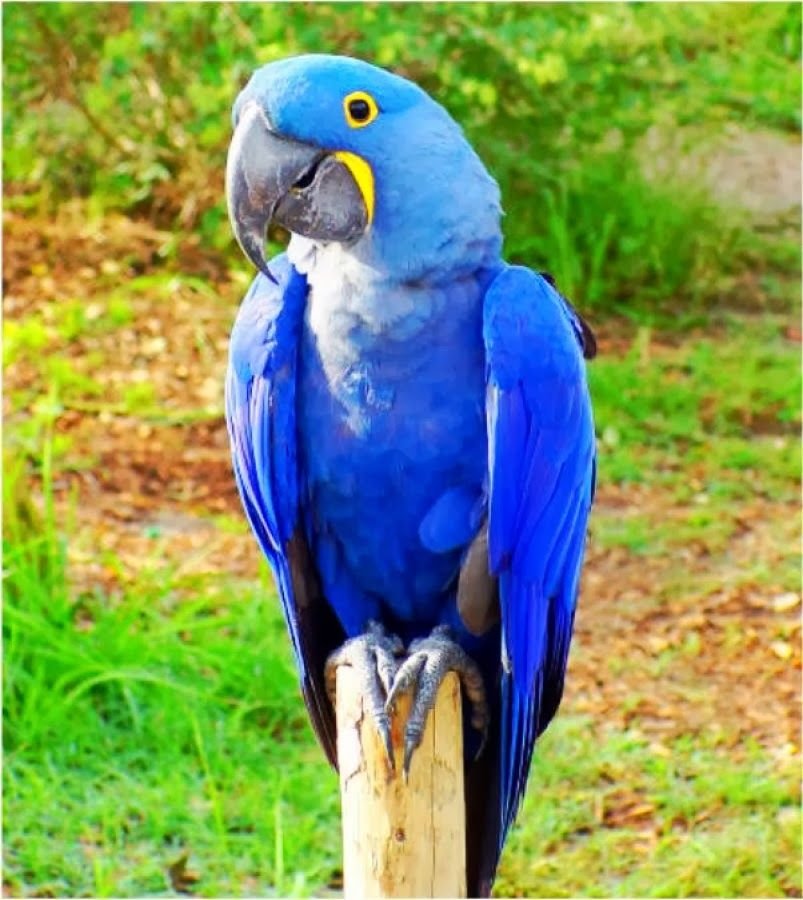The Hyacinth Macaw facts is one of the most gentle of macaw species. Hyacinth Macaw price Is very high in all Macaws. In Wild The Hyacinth is a large, cobalt blue macaw with yellow facial skin around the eyes and along the growing edge of the upper and lower mandible. The underside of the wings and tail is black. The beak is black and the eyes are red-brown in the juvenile and female, and dark brown to black in the male. The feet are grey and the nails are black. Hyacinth In captivity many people kept as pet in their house.
Basic Information

Length 81-94 cm
Weight Range 1100—1600 gm
Breeding Age 7-8 years of age
Clutch Size 2-3 eggs
Incubation Period 28 days
Fledging Age 16-20 weeks
HYACINTH MACAW IN THE WILD
The Hyacinth Macaw is found in the heart of South America. Their varied habitats include areas of northeastern Brazil, eastern Bolivia and northernmost Paraguay. Habitat destruction and collection for the local live bird and feather trade are blamed for its continued decline. It is protected throughout its natural range and is listed in CITES Appendix I as Vulnerable.
The biggest pressure on Hyacinth Macaws in the wild is habitat destruction. In the past, uncontrolled illegal trade took its toll, but today goats and other livestock are denuding the land where this species feeds. In fact, any macaw species that eats palm nuts is at risk due to increased agriculture in their habitat. Studies in the Brazilian Pantanal region indicate an increase in wild Hyacinth Macaw populations in that area.
Biologists who have studied and observed this species for over 20 years claim the nestling production is rising and the total population has increased dramatically. Dedicated biologists, such as Dr Neiva Guedes of Brazil, have made a huge impact on the conservation of Hyacinth Macaws and as her work continues, this species still has a chance to recover from its historic decline.
HYACINTH MACAW IN CAPTIVITY
The Hyacinth Macaw is now fairly common in captivity outside of its native countries of Brazil, Paraguay and Bolivia. History of this magnificent species is sad as many specimens have been illegally removed from the wild and have met with their death while being smuggled to marketplaces across the world. One reason for the smuggling of this species can be directly attributed to the difficulty in obtaining permits to sell captive-bred representatives of this species from one country to another.
Hyacinth Macaw in Captivity not really easy to breed, the captive breeding of the this bird has been quite successful. Captive pairs have proven to be quite consistent once they are established. Breeders with large specialist collections of Hyacinth Macaws do not seem to be as successful as smaller breeders with one to five pairs. This has not been proven, it appears that when high concentrations of pairs are gathered together in one location, only dominant alpha and beta pairs breed. of course there could be other factors, such as how closely they are housed, that may play an important role in breeding success.



As captive-reared pets, this species is the gentlest and seemingly the most intelligent of the macaws. Just because they are gentle, however, does not mean that they are not mischievous. They get into trouble if left unsupervised in a house, something that should never be done. Hyacinth Macaw reach sexual maturity at eight years of age, they may choose one person as a mate and display some aggression when approached by others.
Hyacinth Macaw Price:
The only macaw that could cost you a true fortune would be a Hyacinth Macaw who could have a price rag that can range up to the $20000 mark on the higher end. Hyacinth Macaw price Is very high in all Macaws
Hyacinth Macaw Facts:
Some of the Hyacinth Macaw Facts as below
Pet Suitability:
Probably one of the most gentle of the larger macaws. Hyacinth Macaw owners frequently compare their pet birds to puppies. They require large, strong cages and plenty of enrichment to keep them busy and occupied during cage time.
Nature:
The words gentle, docile and inquisitive have all been used to describe the nature of a Hyacinth Macaw Facts.
Mimic Ability:
Another Hyacinth Macaw fact is One of the better mimics. They have two voices, a low guttural voice and a high sweet tone. Most captive birds learn several phrases and words and can be taught to speak on command easily.
Noise Level:
These are a large bird with large sound capability. However, unless they are unhappy about something, pet Hyacinths rarely perform by screaming. But when they do, it will carry for a long distance and everyone will know there is a bird nearby! Most pet birds are fairly quiet and content.
Breeder Suitability:
This is another species that is not purported to be an easy subject to breed in a caged environment. They are heavy wood chewers and have been known to break welds and chew heavy gauge wire as well. They develop a very strong pair-bond when compatible. Good pairs make excellent parent birds, but will generally only fledge one youngster at a time. Pairs need privacy and often display unexpected aggression during egg laying or rearing of young.
TAGS: Bird Cage for Macaw, blue and gold macaw, Glaucous Macaw, Macaw, pet birds, Pet Blog, pet guide,
